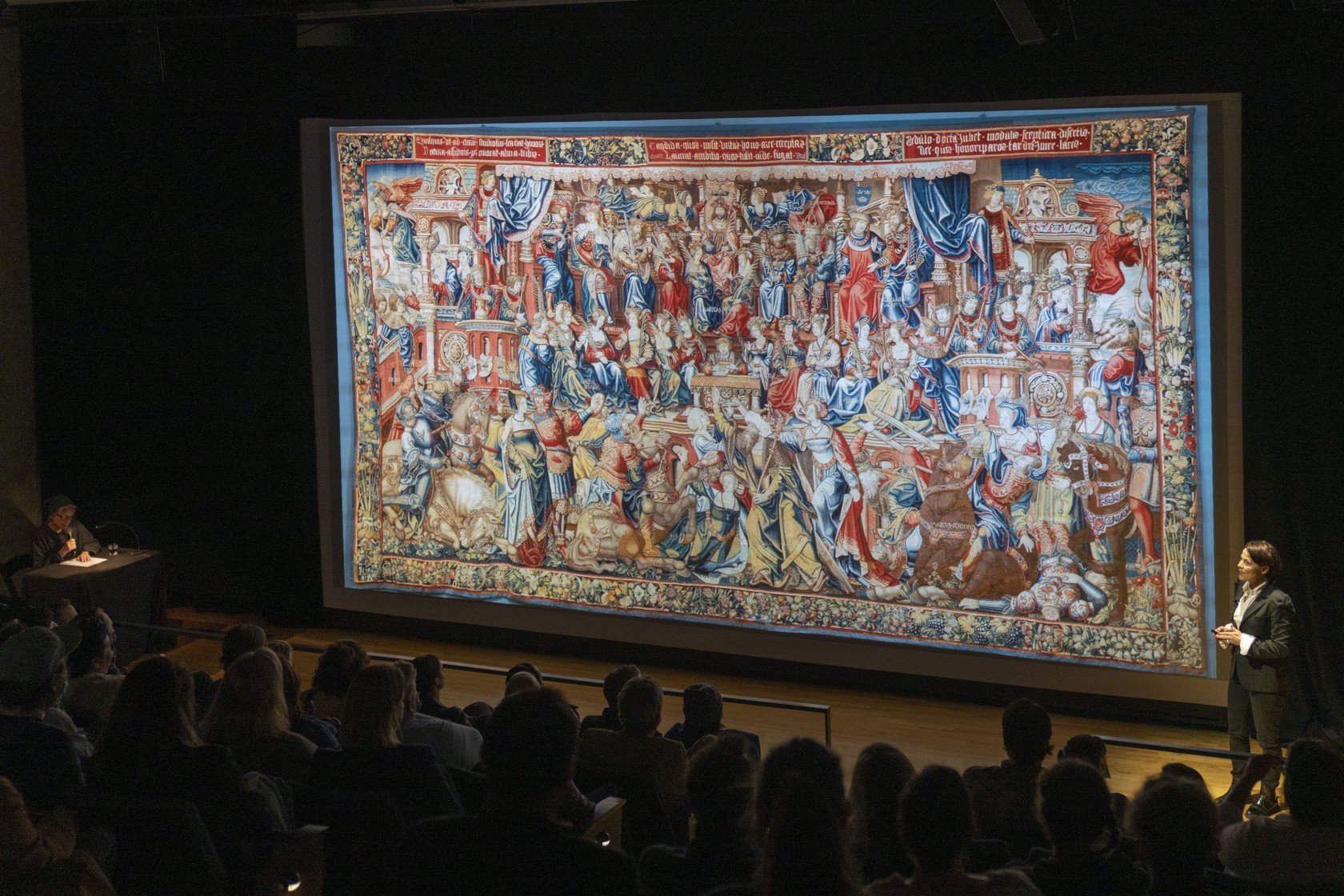The Texas Performing Arts and Fusebox brought the erudite and witty exposé Honor, first commissioned by The Metropolitan Museum of Art, to our city for a series of performances and an artist’s talk.
Written and created by the brilliant Suzanne Bocanegra, the artist, directed by Geoff Sobelle, and performed by Lili Taylor, who had a most unusual role as a simultaneous voice transcriber of Suzanne’s story. Before the show, I attended the Fusebox hosted artist talk with the triumvirate. The questions posed to Suzanne and Lili didn’t do justice to entice me to see the actual performance. The talk gave hints about the rich complexity of the topic and the humor. Based on the discussion, I couldn’t entirely fix my imagination around how having your lines delivered via an earpiece/earphone was worth seeing.
But it was!
The experimental NYC-based theater company, The Wooster Group, first cultivated this method many years ago. During the artist talk, Suzanne said she started using this technique after the actor, Paul Lazar, introduced it to her while he was recording her lecture to practice/rehearse with. Paul has performed with The Wooster Group in the past.
Suzanne Bocanegra’s Honor is a daring act of artistic subversion, a performance that cleverly masquerades as an artist’s talk before unfolding into something far more intricate and unexpected. By appropriating the structure of a lecture—a form typically associated with authority, expertise, and structured knowledge—Bocanegra systematically dismantles those expectations. She transforms what seems to be an academic presentation into a deeply personal, theatrical, and conceptual experience. This calculated unraveling challenges the boundaries between artist, performer, historian, and audience, compelling viewers to question what is being presented as fact, interpretation, or even fiction.
At the heart of Honor is Bocanegra’s obsession with one of the Metropolitan Museum of Art’s most monumental tapestries, Honor (from The Honors series), a staggering 19-by-25-foot textile masterpiece from the 16th century. Rather than offering a straightforward analysis of its intricate details and rich symbolism, Bocanegra refracts the tapestry through her artistic lens, blending personal narrative with historical context to blur the lines between the objective and the subjective. In doing so, she interrogates the tapestry and the entire process of meaning-making—how we interpret, categorize, and imbue art and history with significance and facts.
Adding another layer to this conceptual provocation, celebrated film and theater actor Lili Taylor takes on the role of The Artist in the performance, effectively displacing Bocanegra herself. This casting choice not only disrupts but also enriches the conventional artist talk, emphasizing performance over authorship and questioning the role of identity in artistic discourse. Bocanegra’s thoughts, memories, and analyses inhabit Taylor, creating a doubled experience that constantly reminds the audience of the presentation. The performance becomes a mirror of the tapestry—both rich with interwoven narratives, layered characters, and an ambiguous relationship between the individual and the collective.
Through Honor, Bocanegra reinterprets the tapestry’s historical narratives and critiques contemporary artistic structures—who speak, interpret, and how the art world constructs authority. The work plays with authenticity, performative, and the instability of meaning, ultimately challenging viewers to reconsider their own roles as passive spectators or active participants in seeing and understanding art. It prompts a deep introspection into the nature of art appreciation and interpretation.
Suzanne Bocanegra’s Honor is emblematic of her broader artistic practice, which frequently involves deconstructing traditional narratives, blending historical research with personal memory, and challenging the ways in which authority and expertise function in art and culture. Her work often exists at the intersection of performance, visual art, and conceptual storytelling, and Honor is no exception—it takes an established format (the artist lecture) and subverts it to create something hybrid, destabilizing, and penetrating. This performance challenges the boundaries of traditional art forms and invites the audience to reconsider their roles as passive spectators or active participants seeing and understanding art.
A recurring theme in Bocanegra’s work is her engagement with craft traditions and historical art forms, particularly those associated with textiles, women’s labor, and decorative arts. Many of her pieces explore the tension between meticulous, labor-intensive processes and the often-dismissed status of craft within the hierarchy of fine art. This tension is central to Honor as she interrogates the colossal tapestry’s intricate construction, its makers, and shifting meanings. Instead of presenting the tapestry as a static artifact, she treats weaving as a living document that various cultures have interpreted, valued, and mythologized differently across centuries, much like her own performance.
Bocanegra’s fascination with obsession—both personal and cultural—plays a central role in Honor. Much of her work stems from her fixations, whether on historical figures, objects, or processes, and she amplifies that sense of obsession with an accumulation of detail, pattern, and layered meaning. Here, her preoccupation with the Honor tapestry becomes the driving force of the performance as she dissects its imagery, symbolism, and personal resonance. By making her artistic obsession the subject, she implicates the audience to fixate on the tapestry, her words, and the instability of the historical meaning itself.
Ultimately, Honor fits seamlessly into Bocanegra’s more extensive oeuvre, in which she consistently questions systems of knowledge, disrupts traditional formats and manipulates the interplay between personal and historical narratives. This reinforces her ongoing interest in who tells stories, how art is valued and contextualized, and how the past shapes our understanding of the present.
https://www.suzannebocanegra.com
The Wooster Group: https://thewoostergroup.org/company
